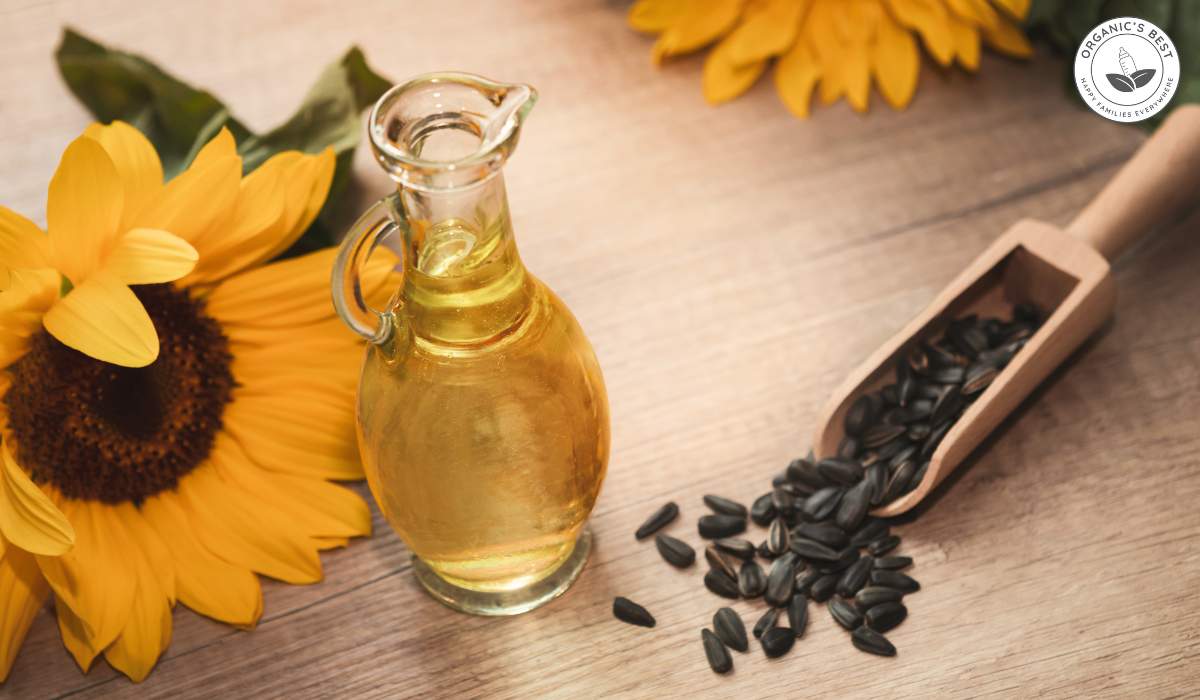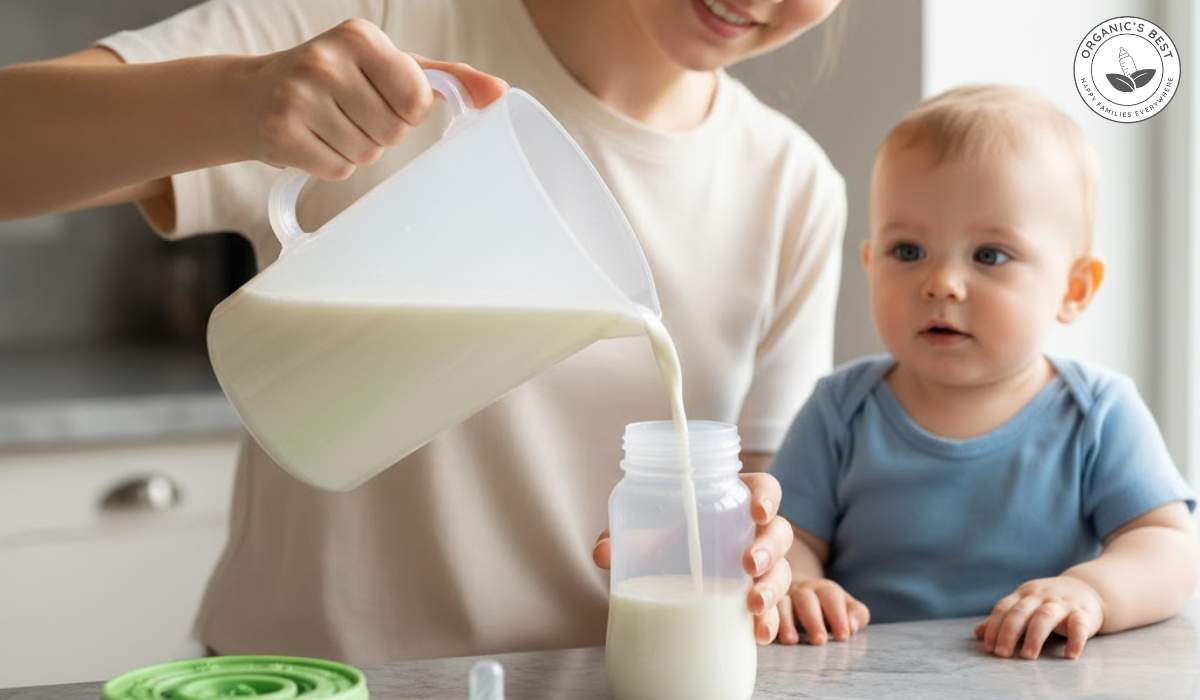Click to Get 2 FREE Boxes/Cans
Only New Customers! Click HERE to Get 2 Extra Boxes/Cans for Free With Your First Order.
BABY FORMULA
Offering new parents top-quality European infant formula from renowned brands like HiPP, Holle, Kendamil, and more. If you’re uncertain about which product to choose, our Formula Finder can help you make the best decision for your baby.
Baby Food
Offering new parents a premium selection of European baby foods, including jars, pouches, cereals, and snacks from esteemed brands like HiPP and Holle.
Why Are Seed Oils in Baby Formula Important? A Guide for Concerned Parents
by Agustina Fernandez September 16, 2025 7 min read

Parents want to make sure that what ends up in their little one's tummy is nourishing, filling, and good for them, especially during the first year, when tiny bodies require enormous amounts of fuel to grow and develop.
With so many formulas on the market and so many different ingredients, it can be overwhelming to figure out what's truly best for your baby. Some ingredients feel straightforward, like lactose or added vitamins, while others spark more questions and even concern.
Seed oils are one of those hot topics. They're in a huge range of foods adults eat every day, from salad dressings to bread, and yes, they're also in baby formula. But what does that really mean for your little one? Is it safe? Is it necessary? Or should you be worried?
Let's get to the bottom of this controversial ingredient and clear up the confusion. We will also let you know what seed oils are, which ones are commonly used in baby formula, and whether or not there are any baby formulas without seed oils.
Table of Contents
First Up: What Are Seed Oils?

Seed oils are oils that are extracted from the seeds of plants, such as sunflower seeds, flax seeds, chia seeds, or sesame seeds, to name a few. Oil extraction typically relies on high heat and pressure to release the oil, whereas cold-pressing gently crushes the seeds to draw out their natural oils without the use of added heat.
You probably use these oils in your kitchen without even thinking about it. Here are some of the most commonly used ones:
• Canola oil
• Grapeseed oil
• Soybean oil
• Sunflower oil
• Safflower oil
These oils are widely used in cooking and food production because they're mild in flavour, affordable, and high in certain fatty acids.
From a nutrition standpoint, seed oils are primarily made up of fats. That may sound scary if you associate "fat" with "bad," but for babies, fat is essential.
In fact, in later stages, human breast milk contains 3%-5% fat, with research showing that "mature milk contains 65-70 kcal per 100 ml of energy, and about 50% of the total calorie supply is fat".
This means that fats are one of your baby's main energy sources, and they play a crucial role in growth, brain development, and even hormone production.
Some people worry that these oils could contribute to problems like inflammation, cancer, diabetes, or heart disease because they're high in polyunsaturated fats. But when you dig into the research, the picture isn't so straightforward. In fact, a 2022 review by the World Health Organization (WHO) found that getting plenty of omega-6 fats from seed oils is unlikely to raise the risk of death or chronic disease.
What Are the Types of Seed Oils Used in Baby Formula?
Not all oils are created equal, and not every formula uses the same ones. Here are some of the most commonly used oils in baby formula:

-
Sunflower oil - Rich in linoleic acid (an essential omega-6 fatty acid). Sunflower oil helps formulas mimic the fatty acid profile of breast milk.
-
Soybean oil - Another major source of essential fatty acids, including both omega-6 and small amounts of omega-3s.
-
Canola oil - Contains a good balance of omega-6 and omega-3 fatty acids, making it a helpful addition for brain and eye development.
On top of oil from seeds, you may also find these oils on a baby formula label:
-
Coconut oil - Not technically a seed oil, but often included for its medium-chain fatty acids, which are easily digested and quickly used as energy by infants.
-
Palm oil - Another common addition, palm oil is used in baby formula because it provides palmitic acid, a fatty acid also naturally present in breast milk.
Many formulas use a blend of different oils to get as close as possible to the nutrient balance of breast milk. The choice of oil isn't random. Formula makers carefully select blends to ensure babies get the right mix of fatty acids for healthy growth.
Let's Clarify: Why Are Seed Oils Added to Infant Formula?
If breast milk already contains the perfect balance of fats, formula makers need to replicate that as closely as possible. That's where seed oils come in, and why it's impossible to find a seed oil-free baby formula.
To Provide Essential Fatty Acids
Babies cannot make certain fatty acids on their own, meaning these must come from their diet, and seed oils are reliable, safe sources.
To Support Brain and Eye Development
The fats in oils from seeds help build DHA and ARA (special long-chain fatty acids), which are critical for developing vision, learning, and memory.
To Provide Energy
Babies grow fast. In fact, they double their birth weight in about 5 months. To fuel this growth, they need calorie-dense fuel, and fat is the most concentrated source of energy.
To Absorb Vitamins
Fat is necessary for absorbing fat-soluble vitamins like A, D, E, and K. Without enough fat, even if vitamins are present, babies can't use them effectively.
Decades of clinical trials and nutritional studies confirm that seed oils in formula are safe and effective in supporting infant growth and health. In fact, their inclusion is one of the reasons modern formulas are so nutritionally complete and similar to breast milk.
Benefits of Seed Oils in Baby Formula
Here's a breakdown of what these oils are actually doing for your little one:

Brain Development
Seed oils supply linoleic and alpha-linolenic acids, which serve as building blocks for DHA and ARA, two fatty acids directly linked to brain and eye health. These nutrients help wire a baby's developing nervous system.
Immune Function
Fatty acids from seed oils also play a role in building healthy immune responses. They help reduce inflammation and support the body in fighting infections.
Healthy Growth
Fats provide nearly half of the energy in both breast milk and formula. Without adequate fat, babies wouldn't grow at the rapid pace they need to.
Eye Health
Omega-3 fatty acids, present in seed oil blends, are crucial for the development of the retina and visual pathways.
Vitamin Absorption
Fat helps the body absorb vitamins A, D, E, and K, which all play essential roles in growth, bone development, and blood clotting.
When you look at it this way, seed oils aren't fillers or "cheap substitutes", they're a scientifically chosen part of the recipe to make formula mimic breast milk as closely as possible.
Why Do Some Parents Concerned About Seed Oils in Formula?
Despite the benefits, you may have come across blogs, podcasts, or social media posts warning against seed oils, as mentioned above.
It's no secret that seed oils have become a hot-button topic in adult nutrition circles, with some voices labeling them as "industrial oils" or questioning whether they are too heavily processed to be healthy.
These conversations can make any parent second-guess what's going into their baby's formula. But it's important to separate general diet debates from the very specific, highly regulated way seed oils are used in infant nutrition.
One of the main concerns raised is that oil from seeds is overly processed. Critics sometimes worry that during the refining process, harmful by-products could form, or that the oils might somehow lose their nutritional value.
However, the oils used in infant formula are not the same as what you might find in bulk cooking oil on a grocery store shelf. Formula-grade oils undergo strict purification, are food-grade, and must meet rigorous safety and nutritional standards before they are approved for infant use.
Regulatory agencies carefully review both the quality of the oils and the science behind their inclusion, which is why you cannot find a seed oil-free formula. Even top formula manufacturers like HiPP, Holle, Kendamil, and more include these oils.
Another concern that often surfaces is the balance of omega-6 to omega-3 fatty acids. Among adults, it's commonly discussed that many Western diets contain too much omega-6 and not enough omega-3, which can throw the body out of balance and contribute to inflammation.
It makes sense that parents might worry the same could happen to their babies. But here's the important distinction: infant formula is not designed like the average adult diet. Instead, the fatty acid ratio in formula is carefully calibrated to mirror breast milk as closely as possible.
Remember, these oils are not casually chosen or thrown in as cheap fillers; they are carefully sourced, purified, and included in specific amounts to mimic the nutrition of breast milk and meet the unique needs of infants.
Answering Your Questions
Now that we have helped you better understand these oils and their place in your baby's formula, let's answer some of your most asked questions.
Is Seed Oil Safe for Babies?
Yes. Clinical studies, decades of use, and regulatory oversight from agencies like the Food and Drug Administration (FDA) and the European Food Safety Authority (EFSA) confirm that seed oils are safe and necessary for infant nutrition due to their several health benefits.
Is Seed Oil-Based Formula Suitable for Every Baby?
Yes, however, if your child has specific health conditions, such as metabolic disorders, fat malabsorption, or severe allergies, your pediatrician may recommend a specialized formula with specific oils.
Does All Baby Formula Have Seed Oil?
Yes, all specialty, cow's milk, and goat milk formulas include some type of seed oil to supply essential fatty acids.
|
Disclaimer: Please be aware that this information is based on general trends in babies, and it is not medical advice. Your doctor should be your first source of information and advice when considering any changes to your child’s formula and when choosing your child’s formula. Always consult your pediatrician before making any decisions about your child’s diet or if you notice any changes in your child. Breastfeeding is the best nutrition for your baby because breast milk provides your child with all the essential nutrients they need for growth and development. Please consult your pediatrician if your child requires supplemental feeding. |
Agustina Fernandez
Dr. Agustina Fernandez earned her medical degree from the prestigious Universidad Nacional de Córdoba, Argentina. With a deep-rooted passion for pediatrics, Dr. Fernandez is currently on the path to specializing in children's healthcare. Recently, she has delved into the vital field of infant nutrition. Her research interests include breastfeeding, infant formula, and baby food in little ones’ formative years. Dr. Fernandez's commitment to this area of study underscores her dedication to ensuring the health and well-being of children from their earliest days.
Leave a comment
Comments will be approved before showing up.
Also in Organic Infant Nutrition and Health Blog

Everything You Need To Know About Winter Pregnancy: Essential Tips for Moms-to-be
by Agustina Fernandez December 16, 2025 8 min read
Read More
Can You Bring Baby Food Pouches on a Plane? Essential Tips for Parents
by Agustina Fernandez December 09, 2025 7 min read
Read More
The Formula Pitcher: Is It Safe To Make A Whole Pitcher Of Baby Formula?
by Agustina Fernandez December 02, 2025 8 min read
Read More